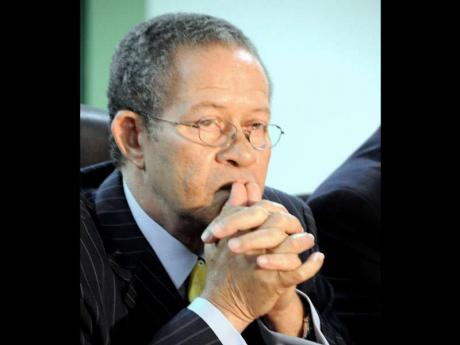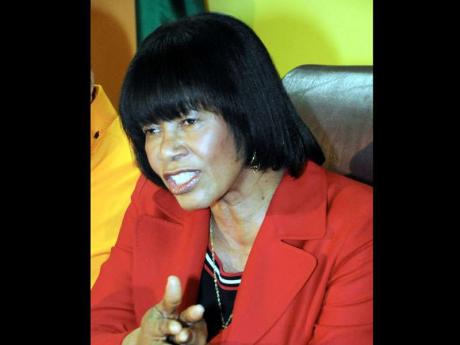Pillars of democracy
Robert Buddan, Contributor
THREE KEY pillars of democracy are separation of powers; independence, impartiality, and neutrality; and trust. These are the issues at stake in Bruce Golding's announced commission of enquiry into the Golding-Brady-Coke-Manatt crisis, itself a breach of all three. It is this breach that leads to a crisis of integrity, and of confidence in government.
In a letter to the prime minister (October 25), the leader of the Opposition raised all three. Portia Simpson Miller referred to the importance of the "separation of party and Government"; the widespread calls for the "establishment of an independent commission"; and the importance of trust breached by ignoring the promise of consultations with the leader of the Opposition, about which assurance was given in Parliament just a week before. The importance of a system of trust was evident in the presumption behind the Vale Royal understandings that began between former Prime Minister P.J. Patterson and then Leader of the Opposition Edward Seaga.
Separation of powers, as Mr Golding should know, is the key principle of the American presidential system. He once led a party that advocated this principle above all else. Independence, impartiality and neutrality, as every student of public administration knows, are the cardinal principles of the Westminster-Whitehall system, aimed at preserving the integrity of the civil service from political encroachment. Trust is just basic to all forms of governance, from the household and the school to the state.
Speaking Up
Yet, Golding was able to overturn and defy all these great principles of democracy in one act of establishing this commission of enquiry. You wonder if anyone will want to sacrifice his personal integrity to sit on this commission. The Financial Sector Adjustment Company (FINSAC) enquiry suffered from a similar failure of credibility. The court in that case found that even if the commissioner was not biased, he might have appeared to be so. Yet, despite that finding, Golding still went ahead and defiantly appointed a commissioner who might be faulted in the same way.
The leader of the Opposition spoke up for the integrity of Parliament and the rule of law in her letter. Betty-Ann Blaine's New Nation Coalition speaks for taxpayers when she said that the lack of objectivity that can be expected from the enquiry makes it a "farce and a waste of taxpayers' money". A media-action group is speaking for civil society. It said, "All the groups that called for accountability regarding the Dudus and Manatt, Phelps & Phillips issues now need to mobilise and make plans to hold government accountable." There were many such groups that called for the truth.
On May 19 this year, the People's National Party issued a press release calling for Golding to tell the nation the truth, the whole truth, and nothing but the truth on this matter. The President's Council of 64 private-sector organisations declared, "We join others in the call for full disclosure in Parliament". The Jamaica Manufacturers' Association noted high levels of scepticism among its members and wanted "full and total disclosure". Jamaicans for Justice wanted "full disclosure" to build back credibility in parliament. Jamaicans United for Sustainable Development wanted the "total truth".
Can they say they will get the whole truth and full disclosure under conditions that breach separation of powers; impartiality, or the appearance that there will be; and trust when Golding failed to consult with the leader of the Opposition about the terms and composition of the commission of enquiry?
Cardinal Principles
We have already seen the debacle government falls into when it violates cardinal principles. Dorothy Lightbourne had turned separation of powers on its head through a doctrine of executive dominance. She did this to justify the executive's intervention in the Coke case, which rightfully, should have been determined immediately by the court. Audley Shaw did this when he did not conduct due diligence before appointing the commission of enquiry into FINSAC. Now, Golding has announced that his admitted misbehaviour will be enquired into by a commission of enquiry that he has unilaterally appointed.
The Supreme Court had determined in the FINSAC case that a sacred principle existed and must be respected. It cited Lord Bingham (House of Lords, 2004) who said that any tribunal established to examine issues between citizen and citizen (like Golding and Brady) and citizen and State (like Brady and government) should be impartial and independent. Lord Bingham was restating something fundamental to the Westminster-Whitehall system of government that his court and ours were empowered to uphold.
The Jamaican court went on to cite another well-known principle: that a man may not be a judge in his own cause. You could argue, as many are doing, that when Golding, whose behaviour is being enquired into, unilaterally appoints a commission of enquiry and when furthermore, that commission is to be chaired by someone whose association with the Jamaica Labour Party (JLP) is a matter of the record, Golding is in effect being a judge in his own cause.
The court in the FINSAC case did not say that Justice Boyd Carey was biased. But neither did it feel that this had to be proven. What it said was that justice should not just be done, but be manifestly and undoubtedly seen to be done. Justice might not, in fact, be done, even with the right motives because of what the Supreme Court called "unconscious bias".
So, we have been here before and just this year, too. It seems as though the Government is neither willing to heed or to learn. It continues to go about its business in the "in-your-face" style. But this has also caused tremendous backlash over and over again. Why then has it gone this route?
Some believe it is to deflect attention from the court case that Mr Brady has brought against Golding. Others believe it is an appeasement to the fighting factions in the party, to clear names and defend reputations so that a conference can be reasonably held in November. It might be to please nervous party financiers who feel embarrassed and who want it to at least appear that something is being done to get to the truth.
If any of this is true, then we will have once again an example of a government putting the rule of politics above the rule of law. What action should ensure the rule of law? The media-action group wants mobilisation to hold government accountable. The President's Council of private-sector organisations wanted full disclosure as a precursor for resuming participation in the public-sector partnership for transformation. The President's Council said some of its members felt that Golding should resign and that there should be sanctions against all those responsible for bringing Jamaica into disrepute. So did an umbrella group of church organisations.
The other call to action was for an independent commission of enquiry, which brings us to where we are today. There is nothing to stop the Opposition and civil society from conducting their own independent enquiry or fact-finding mission, giving all those who want to have a chance to say what they know and to clear their names. Probably this is one other course of action that might be considered.
Robert Buddan lectures in the Department of Government, UWI, Mona. Email: Robert.Buddan@uwimona.edu.jm. Feedback may also be sent to columns@gleanerjm.com.


